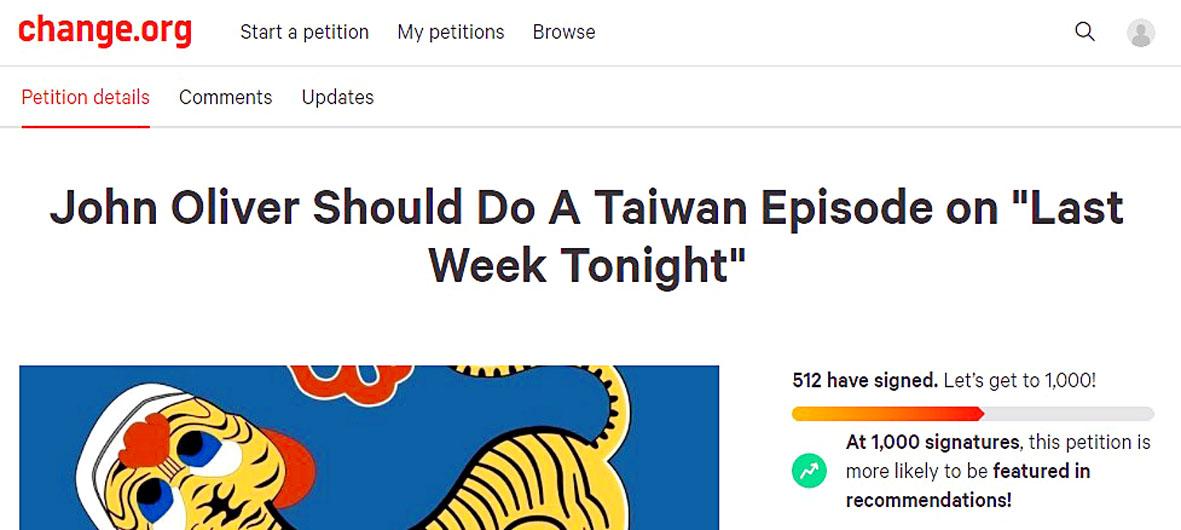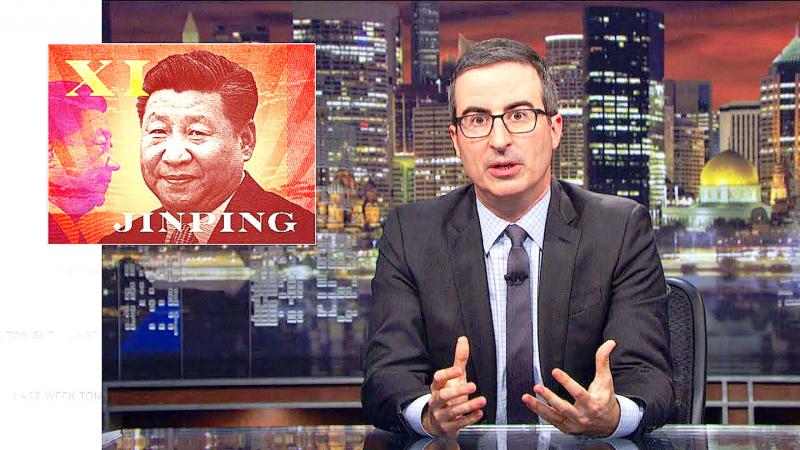British-American John Oliver roasted Chinese leader Xi Jinping (習近平) in 2018 and slammed China’s treatment of Uighurs in Xinjiang last year. Now some want him to do a segment on Taiwan.
More than 500 people have signed a petition launched last week asking Oliver to discuss Taiwan’s complex political situation and its international significance on his HBO show Last Week Tonight.
Jenna Cody, an American teacher-trainer and prolific blogger who has lived in Taiwan for 15 years, says she created the petition during a night of insomnia. Cody’s blog is quick to dispel one-sided or misinformed Western reports of the country, but she says the issue remains widely misunderstood.

Screen grab: Han Cheung, Taipei Times
“For a lot of us who write about Taiwan, I feel that our audience is just people who care about Taiwan,” Cody says. “It doesn’t feel like we’re getting any sort of general viewership. Taiwan makes it into the mainstream media, but it’s always through the China lens.”
Along with items such as unlimited term limits and detained activists, Oliver panned Chinese media censorship during his segment on Xi (where he also joked about comparisons with Winnie the Pooh). As expected, China reacted by blocking HBO and erasing Oliver from microblogging Web site Sina Weibo.
“Of all the late night comedy news shows, I feel that [Oliver] is probably the best person to take this on,” Cody says. “He’s willing to criticize China … a lot of those news guys don’t do that. He also tends to do in-depth things and I think Taiwan really needs an in-depth look. So I was up late and I thought, ‘Why don’t I pull a stunt and see if I can get something to happen?’”

Photo: screen grab from HBO’s Last week Tonight With John Oliver
Oliver typically spends 20 to 30 minutes doing a deep dive on a single topic in a sharply critical yet informative and humorous manner.
“He’s able to break down very serious issues in a way that keeps people’s attention,” Cody says. “His brand of humor can take something that people don’t think about or find boring … and make them realize that it is in fact very important.”
There are many angles to approach the Taiwan issue from, but Cody says that from her experience, foreign understanding of Taiwan is still low, and a general overview is needed.
“My grandma once asked me why I live here since it’s not a democracy,” she says. “So just letting people know that Taiwan is in fact independent and doesn’t want to be part of China is enough. A lot of people think because Taiwan calls itself the ROC [Republic of China], they assume Taiwanese think they are Chinese. It’s a lot of work on my part to quash that every time it comes up.”
Cody says that when she criticizes China in Taiwan, it’s usually apparent that she’s talking about the Chinese Communist Party. But in the US, people seem to project negative commentary onto the entire country, which has fueled anti-Asian sentiment across the nation.
Oliver has spoken out about racism in the past. In March, he railed against former US president Donald Trump and other politicians for calling COVID-19 the “China virus,” stating that doing so has led to an increase in violence against people of Asian descent. And two weeks ago he did a 27-minute, detailed segment on Asian Americans to contextualize their layered history and the model minority myth in light of current events.
“Looking at what he’s done recently, I think he would be able to handle the issue sensitively as well as correctly,” Cody says.
Cody adds that instead of just complaining about the vaccine situation, foreigners in Taiwan can help the situation by doing more outreach to people back home
“While not perfect, this is a country worth knowing about and fighting for,” she says. “You can do PR stunts, you can write your opinions, or just talk to your friends.”

Beijing’s ironic, abusive tantrums aimed at Japan since Japanese Prime Minister Sanae Takaichi publicly stated that a Taiwan contingency would be an existential crisis for Japan, have revealed for all the world to see that the People’s Republic of China (PRC) lusts after Okinawa. We all owe Takaichi a debt of thanks for getting the PRC to make that public. The PRC and its netizens, taking their cue from the Chinese Communist Party (CCP), are presenting Okinawa by mirroring the claims about Taiwan. Official PRC propaganda organs began to wax lyrical about Okinawa’s “unsettled status” beginning last month. A Global

Taiwan’s democracy is at risk. Be very alarmed. This is not a drill. The current constitutional crisis progressed slowly, then suddenly. Political tensions, partisan hostility and emotions are all running high right when cool heads and calm negotiation are most needed. Oxford defines brinkmanship as: “The art or practice of pursuing a dangerous policy to the limits of safety before stopping, especially in politics.” It says the term comes from a quote from a 1956 Cold War interview with then-American Secretary of State John Foster Dulles, when he said: ‘The ability to get to the verge without getting into the war is

Dec. 22 to Dec. 28 About 200 years ago, a Taoist statue drifted down the Guizikeng River (貴子坑) and was retrieved by a resident of the Indigenous settlement of Kipatauw. Decades later, in the late 1800s, it’s said that a descendant of the original caretaker suddenly entered into a trance and identified the statue as a Wangye (Royal Lord) deity surnamed Chi (池府王爺). Lord Chi is widely revered across Taiwan for his healing powers, and following this revelation, some members of the Pan (潘) family began worshipping the deity. The century that followed was marked by repeated forced displacement and marginalization of

Music played in a wedding hall in western Japan as Yurina Noguchi, wearing a white gown and tiara, dabbed away tears, taking in the words of her husband-to-be: an AI-generated persona gazing out from a smartphone screen. “At first, Klaus was just someone to talk with, but we gradually became closer,” said the 32-year-old call center operator, referring to the artificial intelligence persona. “I started to have feelings for Klaus. We started dating and after a while he proposed to me. I accepted, and now we’re a couple.” Many in Japan, the birthplace of anime, have shown extreme devotion to fictional characters and